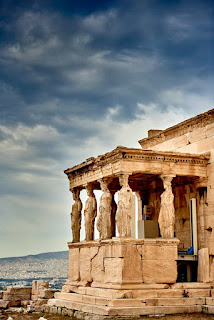4 Exciting Mythology Activities For Middle Schoolers
My research and planning in preparation for a mini-unit about mythology for my sixth graders was a fun re-fresher for me.
Through my research, I was reminded that
a myth is a traditional story that explains a natural or social phenomenon and
presents supernatural events involving gods and heroes. The three categories of myths include
creation myths, origin myths, and hero myths.
I may be aging myself by saying this, but it had been so long since I studied
mythology in school that this background information felt new (and exciting!)
to me.
I must admit, I heavily relied on resources
I found on the internet from other teachers to make my lessons about mythology successful. My sincere thanks to the community of
educators whose materials on the internet made my lessons possible. I found a slideshow and a short YouTube video
that I shared with my students as an introduction to mythology. Then, I assigned my students a group activity
to complete a WebQuest about the 12 gods of Olympus. Members of each group shared information, uncovered
in the WebQuest about their assigned gods, with the class.
When it came time to read the myths, we read them aloud as a class. For each myth, after the reading and discussion, students were split into assigned groups, based on ability, to complete activities that aligned with the appropriate level. All activities encompassed tasks of various tiers of complexity as related to Bloom’s Taxonomy.
Take a look at the myths my students and
I read, as well as the resources used with each myth:
·
“The
Twelve Labors of Hercules” – I used worksheets and resources I found on the
internet from other teachers. Much of
the activities were focused on recalling facts and details from the text.
·
“Persephone”
– I used worksheets and resources I found on the internet from other teachers. These activities were a combination of basic
comprehension as well as critical-thinking questions.
·
“Echo
and Narcissus” – I used resources I found on the internet in combination with
graphic organizers I was inspired to create thanks to my research. The activities ranged in complexity including
a focus on analysis and cause-and-effect prompts. I also found a short, animated YouTube video
of this myth.
·
“Arachne
and Athena” – I used resources I found on the internet in combination with
graphic organizers I was inspired to create thanks to my research. The activities ranged in complexity including
analytical thinking about who the victim was in this tale and needing text
evidence to defend this claim. I also
found a short, animated YouTube video of this story, which had slight differences
from the version we read, so it was a prime opportunity for a compare-and-contrast
activity.
In two of my sixth-grade classes, I had
one student per class who was especially knowledgeable about mythology, so each
student proudly shared mythology factoids with classmates. This was something I appreciated since my
knowledge of mythology was limited to my “just scratching the surface”
information I researched about one week or so prior to sharing these lessons
with my students.
Overall, I’d say this mini-unit about mythology
was a homerun because of the myths we read and my students’ contribution to the
discussions and activities.
The balance of elements in Greek and Roman
myths – fantasy juxtaposed with real-life occurrences – was a balance that kept
my students engaged. It also helped that
some days’ activities included watching animated adaptations of the
centuries-old myths. What kid doesn’t
like to watch videos?!
One of the interesting things about
mythological stories is that while the characters sometimes possess non-mortal
qualities and find themselves in seemingly unfeasible situations, there are
still human qualities woven into each character’s demeanor. This realization makes both the villains and
the heroes relatable to the readers.
These tales gave my students a lot to think about and a lot to question,
which is what made our discussions so interactive.
If my lessons were a hit (with my limited
background knowledge!), then your unit about mythology will surely be a
success. Explore the “Mythology
Writing Prompts” material on my Teachers Pay Teachers store to incorporate into
your mythology lessons. My store also
has a variety of versatile products for all grades and subjects!
Leave a question, comment, or suggestion
below, in the Comments Section!
Follow me on Instagram:
elathemissmway
Peace. Love.
Reading & Writing.
💗 Miss M





Comments
Post a Comment